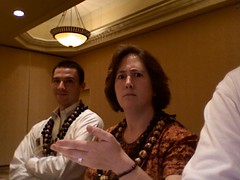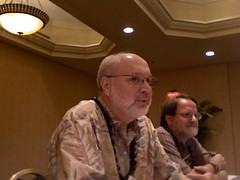Looking at Dead and Emerging Technologies
A panel discussion at HLA 2006
Aaron Schmidt

– floppy disks
– extremely restrictively limited computers in libraries
– CD-ROMS esp for databases: need to pay attention to remote access
– static, boring websites
– Frontpage
– things that Aaron says is dead are still in use
Jessamyn West

– the expertise level that comes between those who want to interact with others on the network
– one way streets like PDF files that I can’t get stuff out of
– PDFs not dying, but like other proprietary standards
Victor Edmonds, UC Berkeley

– technologies are tools to extend people’s power
– we produce around 100 hours of new video per week: question is what format can we put it in?
– DVD going out, but DV tape costs $30 per hour, that is expensive
– problem: there is no format you can count on, that has emerged like paper
– real problem for people who are producing a lot of video, in the future more of us will be producing a lot of video
– web-based services will replace some of these
– course management systems: for each course, the materials for that course are in that system (Sakai, WebCT and Blackboard)
– students already are saying if my course materials are there, why do you take them away from me at the end of the semester? I should be able to go look and see the discussions that took place in the past? So why should that be gone when I leave college?
– Technologies are dead: our vision has reached beyond our grasp
Marshall Breeding, Vanderbilt University
– like Victor I have a hard time killing off techs
– we have lots of interim solutions
– threshold for dead techs is tempered by
– many US libraries don’t have a website and online ILS
– so in that environment, it is hard to think about casting anything off as dead technologies
– my interest is in library automation systems: hopefully current concepts of an online catalog are hopefully dying
– many of what we have now are hindered by their legacy in card catalogs
– many meta-search engines are in use, but hopefull
– federated search model based on distributed query is really not working as well as we’d like them to
New/emerging technologies:
Aaron:
– weblogs permit people to get content on the web that otherwise couldn’t
– also good to promote the idea of communities
– hopefully vendor-based content cooperatives are dead
– IM is
– living in our browsers is an exciting phenomena: not having client centered computers
– having tools like Writely
– devices with longer battery life or less power consumption
– our phones might get better and bigger
Jessamyn:
– emerging where I am is getting our libraries on ANY ILS system
– many of my tiny libraries (5000 books, 1000 patrons) are looking at skipping big ILS systems and going directly to librarything (it is marc record compliant)
– info from US LOC is free but you have to pay 35K to get it
– that is changing
– USGS maps: you have to pay shipping
– now people are purchasing with groups and sending them to the Internet Archive
– more we are not going to see format not be a limitation
– people are getting smart about making things digital
Victor:
– cool to say “living in our browsers”
– where are we going in a real long term: 10-20 years
– going toward invisible computing
– Ray Kurtzweil is right when he talks about computers in our bodies, they will be embedded in our bodies
– he is now about 70, he may be the greatest American inventor since Thomas Edison
– recently saw him give a talk and talk about the recent trends in technology, that looks like all over the place
– now look at this in terms of squaring itself on a regular term (Moore’s Law)
– when you do that, statistics go to a straight line
– Kurtzweil is saying if you live another 20 years
– so question is: what are the steps toward invisible computing?
– at one point, libraries were the center of information in a community
— there have been lots of missed opportunities by the library community, but we can’t blame them b/c it would have required 20/20 foresight
– big emerging technology: convergence of the physical and virtual worlds (now seen through Course Management Systems in higher ed_
— sets of tools that provide info storage, announcements, interactions, wiki tools to collaborate
— Sakai consortium now involves over 200 higher ed institutions
— using these tools for research groups, student groups, etc — using these virtual worlds, populating it with people’s email addresses
— this is causing in higher ed a dynamic where some things take place online, and what takes place F2F
— handout passing out, lots of discussion is taking place online: dynamics are different online compared to F2F
— library community: will be like the virtual library
Marshall:
– should be on the way out: library interfaces that make the user search different places for different things (searching here for books, here for databases, here for articles, etc.)
– in development now: more consolidated discovery environments for libraries following OLI model (taking meta data from your catalog and other resources
– next gen; get rid of silos, present info the way users expect in other web environments
– also video and rich media: at Vanderbilt we have a tremendous quantity of rich media content we are responsible to keep for ever
– this archival role is very important, the networks never recorded much of this: proper curation is key
– have about 120 terabytes of info, working closely with LOC
– hard to preserve this, esp when you see how much video is being created today
– thinking about making
– getting almost to a post meta-data system for search and retrieval, increasingly based more on content of the digital objects themselves
– when Google has the resources to digitize the resource of the 10 largest libraries around, there will be search resources that include the full-text of many millions of books
– that really turns a new leaf
– seeing more automatic ways of indexing video, without it ever being touched by human hands
– not sustainable to use our current models of having humans watch it and manually and write abstracts
– new systems doing face recognition, speech to text– these technologies
– 20,000 videos uploaded to YouTube each day
– how are people going to find this stuff in the future, and who is going to make it available
– another issue: lots of the content is NOT in English
– need to have a better handle on the language translation piece
Aaron:
– DRM is currently a big obstacle for libraries sharing music
Jessamyn:
– copyright laws are a big obstacle today
Marshall:
– LPs continue to be sold and made, but that is a small niche
– CDs are the same way
– problem is how do you distribute music freely and still permit people to make a living
– doesn’t bother me at all to think about buying a new copy of a DVD, our old model was buy 30 copies of a bestseller
– need to find economic models that are sustainable
Victor:
– the current system is really a good deal for libraries and patrons
– your patrons are taking your copy of the CDs
Aaron:
– gaming already going to downloadable
Marshall:
– gaming solutions are the most graphically intensive applications
– until bandwidth and convergence changes this, we’ll still see a lot of these games remain console/PC based
And this was me in the panel (I didn’t take notes on my own comments)

I recorded this as a podcast and will publish later…. 🙂
Technorati Tags: hla06
If you enjoyed this post and found it useful, subscribe to Wes’ free newsletter. Check out Wes’ video tutorial library, “Playing with Media.” Information about more ways to learn with Dr. Wesley Fryer are available on wesfryer.com/after.
On this day..
- Help Students Use Icons and Photos in Narrated Slideshows – 2018
- Add Kindle MOBI eBook to WordPress Online Store – 2014
- Using Minecraft for Virtual Simulations & Oklahoma Ag in the Classroom – 2011
- Improving Reading, Writing and Critical Thinking Skills with Media – 2011
- Why Veteran’s Day is November 11th – 2011
- Video Tributes to Oklahoma and Kansas Military Veterans – 2010
- Digital Citizenship in Libraries: Constructively Leveraging the Power of the Social Web – 2009
- A reminder from Linus about how important personal recognition can be – 2009
- WikiPedia to go (an offline download for schools) – 2008
- Making the case for a safe, moderated learning community for Oklahoma schools – 2008

Comments
4 responses to “Dead and emerging technologies”
[…] Dead and Emerging Technologies […]
Wes, Hafa Adai from Guam. Wow what an excellent conference. I am now back home here in Guam and back to work today(Wednesday). Just wanted to say it was great to meet you. I learned must but I am also very glad you took notes from that last session on saturday afternoon. I will go back and digest things when I get into work later this morning. thanks again for sharing you enthusiasm!
It was great to meet you Bob! Please do say hello to Jacqui Cyrus for me if you meet her in Guam!
[…] My notes from other presenter’s comments during this panel discussion […]